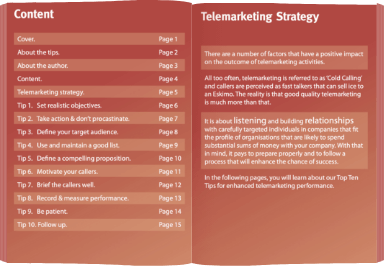Telemarketing is hard enough without failing due to poor technique and approaches. So we’ve compiled 8 success hacks for telemarketing lead generation success. See how you compare in terms of your preparation and readiness to undertake a successful lead generation campaign using telemarketing.
Work hard on your audience
We just need a list, don’t we? That’s often the kind of thing inexperienced telemarketers say. Or, it’s the approach that management takes to undertaking outbound calling. It most certainly isn’t just a list that’s required. If you want to be successful at telemarketing, you need to do work on your database to identify who you’re calling. This means not least:
-
-
- keeping customer databases up to date
- deciding on the target audience in terms of job function, type and size of the organisation, location and so on
- identifying the best source of fresh data e.g. Building data yourself or asking a company like GSA to do it for you or purchase from a reputable list broker
-
Make plenty of calls
There’s no getting away from it. Even if you work hard on your audience, some targets just won’t be at their desk when you call. We always say that you won’t do any business with companies and decision makers you don’t attempt to contact. If you’re fortunate enough to have lots of prospects beating a path to your door, that’s great. But, this article is for those that aren’t so lucky. If that’s the case, you need to build up a head of steam to be successful. You’ll meet lots of rejection.
Even the best telemarketers have to deal with rejection and handle objections. You will get wrapped up in IVR loops on big companies. Those same organisations will have layers of gatekeepers in our way. So, aside for techniques to deal as best you can with these obstacles, you need to make enough calls to succeed. That means around 15-20 calls per hour or 100 calls per day and enough days calling each week/month to drive enough conversations that lead to sales opportunities.
Avoid tired opening lines
You won’t get far, once you reach you target decision maker if your opening line is predictable and scripted to within an inch of its life. It’s crucial that you build rapport from the outset. Whilst you need structure and you need to represent your company appropriately, the opening line needs to be engaging. There are lots of techniques for opening lines (new blog), and it absolutely depends on the kind of calls you’re making.
I favour an approach where you give perceived power to the decision maker. I like to ask for permission. That means an opener such as ‘I’m not sure this is relevant but……’. That sounds less like a pushy telemarketer and less like all the other callers. I then follow this up with something that is hopefully compelling (your key message and benefit) and leverage using appropriate companies we work with in order to name drop and make the prospect feel they’re in good company. Once again, this isn’t the only approach, and it has to suit your style, but you do need to build rapport from the start, especially if the value of the potential sale is high.
Turn your message into a WOW
This isn’t easy. What’s going to make the customer jump out of their seat and shout hallelujah the messiah has arrived? In truth, there aren’t many ways to build excitement into you call. Part of the wow is you. Your attitude carries weight. Strength of conviction motivates. Energy attracts. If you can find something that supports your efforts, all the better. Work out what challenges your customer might have. Are there big issues I their marketplace that need addressing with which you can help? Whatever it is, try to differentiate yourself and your offering from your competitors by being upbeat and saying something that resonates fast.
Ask lots of good questions
Questioning techniques are crucial since they:
-
-
- enable you to stop talking and listen
- encourage the prospect to speak to get a better conversational flow
- allow you to unearth key pieces of information
- direct the discussion towards areas of interest
- stop you sounding like most other telemarketers
- build rapport and trust
-
Good questions generally support effective selling so spend time on these in advance of any calling activity
Qualify to identify genuine prospects
Plan your questions in advance. We pull together a set of profiling questions (to evaluate whether the person/company is a bona fide prospect) and solution selling questions (to scope the need and inform the next stage of the sales process).
In an ideal world, your list building process will eradicate prospective targets that don’t fit your requirements. However, that’s not always possible and sometimes you can only do this through conversation. At that point, therefore, you need to ask the right questions to evaluate feasibility. These could include:
-
-
- Number of sites
- Types and number of machines
- Number of staff
- Current suppliers
- Level of problems with the current approach
- Do they do things in-house or outsource
-
There are likely to be key qualification questions specific to your business so spend time working on the key ones and intersperse them in your conversation.
Conversations not presentations
A conversation with a prospect is a dialogue. It’s not a presentation or monologue. No one responds to being talked at. You won’t have long on the phone if this is how you do it. So, try to ensure that the flow of discussion is at least 50:50. Sadly, all too often, it’s more like 90:10 and the prospect then hangs up.
The key to effective telemarketing is building rapport. At higher values of sale, you won’t get far if you haven’t established credibility and trust with your prospect. So, don’t think of the first part of the call as a presentation of what you do. Think of it as the time to establish rapport so you can get to a point where the prospect asks you to explain more. But, even then, don’t launch into a pitch or list of features and what you do. Think customer first and position what you do in terms of their needs and
Build to a close – suggest a demo, call, meeting
What’s your end game? What outcome do you require from the call? It sounds blindingly obvious. However, too many telemarketers are too easily side-tracked either by a busy buyer or through enjoying the ‘chat’ but missing the opportunity to close it out. Ultimately, if insufficient sales leads are generated, insufficient sales will be the result. Of course, the leads need to be worthwhile. No sales person wants to trek a significant distance only for the prospect to say ‘I’ve no idea why you’re here’.
However, if you wait for every prospect opportunity to be absolutely perfect, you may be waiting for some time. The first objective of cold calling is to identify the opportunity and qualify its level of warmth. Speculative meetings can work really well and create lots of potential business if they’re with the right size and type of prospect. Not every prospect will divulge every detail of their requirement on the phone. Hence, a foot in the door with the right people can lead to great long-term business.
So, you need to start with the end in mind. Tell them you’d like to meet or set up a time for one of your team to do a demo. Invite them to whatever seminar or event you’re running. Ask for the meeting or at least ask for a time to call back if the prospect profile fits your internal requirements. That’s where you build your sales pipeline. I often use the following line if there is no immediate need as long as the prospect is relevant for us.
“When’s a good time to speak again….?” Even if the prospect says “I’ll call you”, I typically say “ That’s great. I’ll give you a call in X weeks if I haven’t heard. Is that okay?” 9 times out of 10 the prospect will agree and it prevents a subsequent conversation which kicks off with the prospect saying “I said I’d call you…”
And, don’t forget to formalise the appointment. If you don’t there is a much bigger risk of the sales person arriving to an absent prospect. Send a calendar diary invitation. Ping over a confirmation email. And consider asking an important question to make the appointment sound more important or urgent. “Do you believe is there’s any reason why you might not be able to make it because….. “. This just tests out the warmth and willingness to meet.
GSA helps businesses, large and small, become more effective in their marketing and business development. We run outbound telemarketing campaigns into the UK, Europe and further afield. Also, with our experience, we provide telemarketing training to help sales teams improve their results. If you’d like to know more, give us a call.






